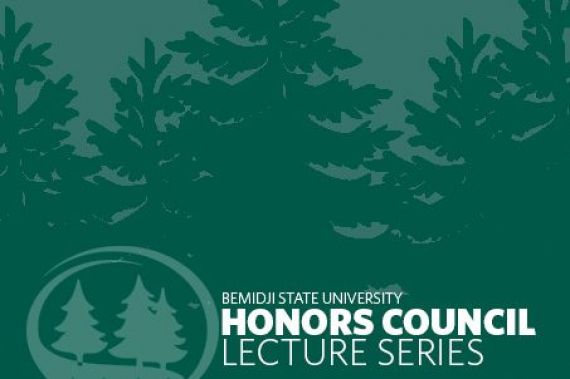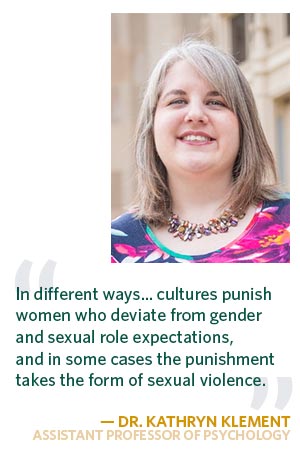
A Bemidji State University psychology professor will explore factors leading to sexual violence as part of the university’s Honors Council Lecture Series.
Dr. Kathryn Klement, assistant professor of psychology, presents “From Virginity to Violence: How Negative Attitudes About Women’s Sexuality Uphold Rape Culture,” March 19 at 6 p.m. in Hagg-Sauer Hall 107.
“In trying to explain causal factors of sexual violence, previous research has demonstrated that rape-supportive beliefs can be a risk factor for committing sexual assault,” Klement said. “Other explanations include rape myth acceptance, rape scripts and institutionalized acceptance.”
 Klement will offer a broader explanation: the culture of expecting and accepting sexual violence against women, known as a “rape culture,” is the result of negative attitudes about women’s sexuality. Her presentation will emphasize two groups of attitudes that provide a foundation for purity culture — a culture that values abstinence until marriage and conservative proscription of women’s sexuality — and for rape culture.
Klement will offer a broader explanation: the culture of expecting and accepting sexual violence against women, known as a “rape culture,” is the result of negative attitudes about women’s sexuality. Her presentation will emphasize two groups of attitudes that provide a foundation for purity culture — a culture that values abstinence until marriage and conservative proscription of women’s sexuality — and for rape culture.
“In different ways, these two cultures both punish women who deviate from gender and sexual role expectations, and in some cases, the punishment takes the form of sexual violence,” Klement said.
Her presentation will include evidence from several studies showing how societal attitudes support both purity and rape culture, and how those cultures relate to each other.
The Honors Council Lecture Series provides a forum for BSU faculty to share their expertise and the results of their research with the Bemidji community. Lectures are open to everyone free of charge.
About Kathryn Klement
Dr. Kathryn Klement is an assistant professor of psychology at Bemidji State. Her primary research focuses on women’s sexuality, particularly the relationship between negative attitudes about women’s sexuality and their behavioral consequences. She has a bachelor’s degree in psychology and political science and a master’s degree in psychology, both from Concordia University Chicago, and a doctorate in social psychology from Northern Illinois University.
BSU Honors Council
The Honors Council Lecture Series is hosted by the Bemidji State University Honors Council, the advisory group to BSU’s honors program composed of 12 faculty members representing each of the university’s colleges. Student representatives are also elected to the council by their cohorts for one-year terms.
UPCOMING HONORS COUNCIL LECTURES
March 19 — 6 p.m. — Bemidji State University Honors Council Lecture Series presents Kathryn Klement, assistant professor of psychology, “From Virginity to Violence: How Negative Attitudes About Women’s Sexuality Uphold Rape Culture.” Hagg-Sauer 107, BSU campus. Admission: free. Information: (218) 755-3984.
April 3 — 6 p.m. — Bemidji State University Honors Council Lecture Series presents Camille Brandt, assistant professor of professional education, “Art on Saturdays: An Inclusive Project for Children Impacted by Autism Spectrum Disorders.” Hagg-Sauer Hall 102, BSU campus. Admission: free. Information: (218) 755-3984.
April 16 — 6 p.m. — Bemidji State University Honors Council Lecture Series presents Jenna O’Dell, assistant professor of mathematics and computer science, “Examining the Mathematical Dispositions of Elementary Students with an Unsolved Mathematics Problem.” Hagg-Sauer 107, BSU campus. Admission: free. Information: (218) 755-3984.
Contacts
- Jennifer Baumann, BSU honors program; (218) 755-3984, jbaumann@bemidjistate.edu
- Dr. Kathryn Klement, assistant professor of psychology; (218) 755-2848; kklement@bemidjistate.edu
 Bemidji State University, located amid the lakes and forests of northern Minnesota, occupies a wooded campus along the shore of Lake Bemidji. Enrolling more than 5,100 students, Bemidji State offers more than 80 undergraduate majors and eight graduate degrees encompassing arts, sciences and select professional programs. BSU is a member of the Minnesota State system of colleges and universities and has a faculty and staff of more than 550. The university’s Shared Fundamental Values include environmental stewardship, civic engagement and international and multicultural understanding.
Bemidji State University, located amid the lakes and forests of northern Minnesota, occupies a wooded campus along the shore of Lake Bemidji. Enrolling more than 5,100 students, Bemidji State offers more than 80 undergraduate majors and eight graduate degrees encompassing arts, sciences and select professional programs. BSU is a member of the Minnesota State system of colleges and universities and has a faculty and staff of more than 550. The university’s Shared Fundamental Values include environmental stewardship, civic engagement and international and multicultural understanding.
2018-B-L-074
